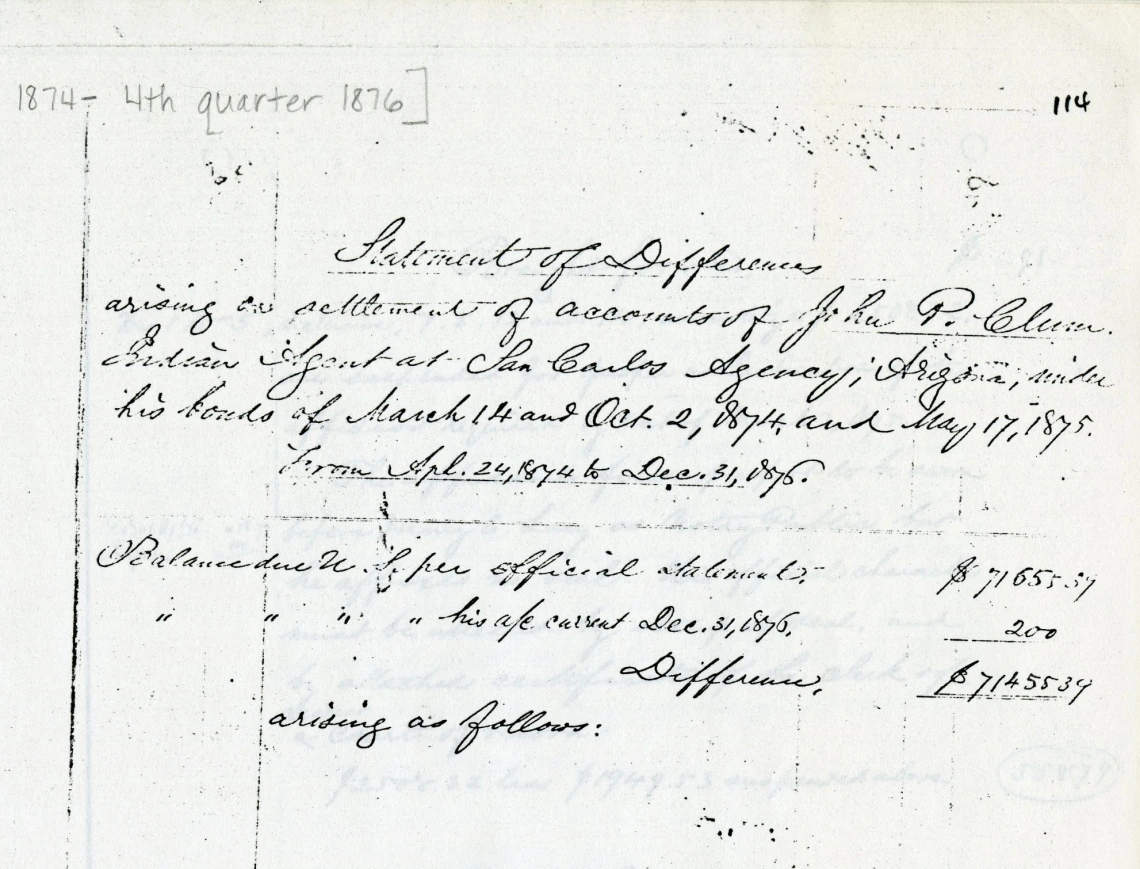John Philip Clum collection

Transcript of Statement of Difference
Collection area: Arizona and Southwest
Collection dates: 1874-1917
Collection, 1874-1917, relating to the financial records and letters kept by the Office of Indian Affairs, the Post Office Department, and the War Department regarding John Philip Clum, and used by Wallace E. Clayton, co-owner of the Tombstone Epitaph, in researching the life of Clum, the founder and first editor of the Epitaph.
The Records include photocopies of San Carlos Indian Agency reports, abstracts of disbursements, vouchers, accounts current, and auditor's reports pertaining to Clum's work at the Agency from 1874 to 1878.
The Career Documents contain information regarding Clum's employment in the War Department and the Post Office Department as well as with the Southern Pacific Railroad. Of interest are photocopies of information documenting Clum's desire to re-enter government service with the Office of Indian Affairs beginning in 1912. Included is a letter in his behalf from Arizona Senator Mark A. Smith.
This material was collected by Wallace E. Clayton, co-owner of the Tombstone Epitaph, in researching the life of Clum, founder and first editor of the paper.
Born on 1 September 1851 near Claverack in the Hudson Valley of New York, John Philip Clum attended Rutgers University, but dropped out of college for health reasons and came West. Arriving in Santa Fe in 1871, he soon became a government astronomical observer with the Signal Corps. From 1874 until 1877, Clum served as Apache agent on the San Carlos Indian Reservation in Arizona Territory.
He adeptly handled the Apache outbreaks from the reservation by asking the military to withdraw to a distance of five miles from the reservation. To limit confrontations between the Apaches and the nearby settlers, Clum helped the Indians to implement agricultural pursuits which would make them self-supporting. He also encouraged them to set up their own law enforcement and judicial systems. As a result of these practices, Clum succeeded in converting many of the Apaches to a more sedentary existence. It was his Apache police force which tracked and captured Geronimo in 1877. Clum soon became a victim of the political situation in Washington. The Indian Commissioner had given the Army permission to once again come onto the San Carlos Reservation. Discouraged by the government's indifferent and unfair treatment of his Indian charges, Clum protested to Washington, and resigned from the Service when his objections were ignored.
In 1877, Clum became editor of the Tucson Citizen. In 1886, after three years as editor of the Citizen, Clum founded and became the first editor of the Tombstone Epitaph, having been attracted to that town by news of the rich silver strike there. Besides publishing the Tombstone Epitaph, Clum was elected Mayor of Tombstone and was appointed Postmaster from 1884-1886.
Clum went to work for the U.S. Postal Service in Washington, D.C. in the late 1880s, but in the early 1890s, he was out west again, serving as Postal Inspector in the western judicial district of Texas. On 5 March 1898, Clum was appointed Post Office Inspector for the Territory of Alaska and charged with the organization and extension of the postal service there. He retired from this post in 1908.
After his retirement, John P. Clum traveled a great deal. A fine speaker, he was employed by the Southern Pacific Railroad as a lecturer. Also, Clum began to write his memoirs, which, after his death, his son Woodworth completed. The resulting book, Apache Agent, was later made into the motion picture, Walk the Proud Land, starring Audie Murphy.
John P. Clum died of a heart attack 3 May 1932 at the age of 81.
A collection guide explains what's in a collection. New to using our collections? Learn how to use a collection guide.
Collection guideAccess this collection
Visit us in person to access materials from this collection. Our materials are one-of-a-kind and require special care, so they can’t be checked out or taken home.
How to cite
Learn how to cite and use materials from Special Collections in your research.
